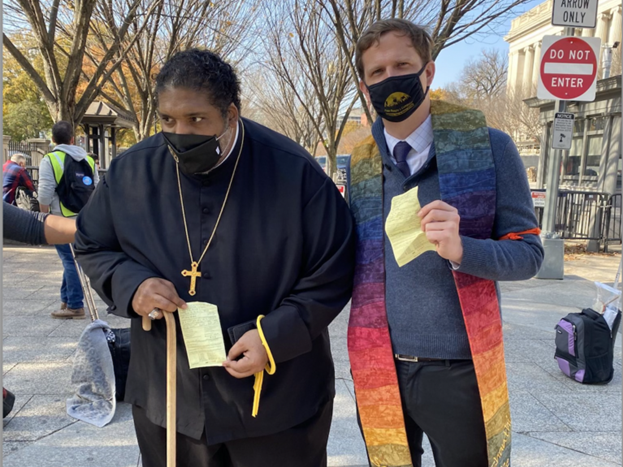At Disability Rights North Carolina, we see injustice and discrimination against people with disabilities every day, yet we were shocked and appalled to learn that at an AMC Theatre in Greenville, North Carolina, Bishop William Barber II was not only denied his basic legal right to disability accommodations, but that theater managers took the step of calling the police and escorting him off the premises as a paying patron with a visible disability simply because he was required to sit in his own chair as an accommodation.
Ironically, it was the administrators, not Bishop Barber, who took this action even though they were breaking the law. Their decision was not only misguided and wrong, but potentially dangerous. Disabled people are injured and killed at an alarming rate in unnecessary and inappropriate encounters with police. Bishop Barber is skilled in nonviolent resistance. If someone without those skills had been involved, the outcome may have been far worse.
I recall the incident in which Ethan Saylor, a young man believed to be mentally disabled, was removed from a movie theater in Frederick, Maryland, and shot to death by police simply because he stayed in his seat until the end of the movie and then tried to watch it again before an attendant helped him leave voluntarily. Ethan died 11 years ago. The Americans with Disabilities Act (ADA) has been the law of the land for almost 34 years. What have we learned in that time?
Clearly this is not enough. Consider the following experiences of people with disabilities we know in North Carolina:
William Oliva, a blind man, was shopping at Hanes Mall in Winston-Salem with his guide dog, Forte, when he entered the retail store Jimmy Jazz. Upon seeing the dog, the store manager called police to have Oliva removed from the store. Police arrived and threatened to arrest Oliva if he did not leave the store immediately, even though the manager was breaking the law. Steven Hardy Braz, who frequently uses a wheelchair, was quietly waiting for the bus at a bus stop in Greenville, North Carolina. A police officer intervened and he was accused, jailed and indicted for stepping onto the road and obstructing traffic, despite the lack of a sidewalk to safely wait for the bus. Michael Nelson, a blind veteran, was in the passenger seat of a car driven by his wife. A police officer approached them in the parking lot and asked for identification. Nelson told the officer that he was not driving and did not have identification. He was charged, jailed and is currently facing charges out of Rockingham County for refusal to show identification and obstruction of justice. Once incarcerated, he was kept in isolation and removed from his prescribed dark sunglasses and hat, causing him to suffer from severe migraines from bright lights. Alexis Ratcliff is paralyzed and requires a ventilator to live. State officials struggled to find a residential facility to keep her on the ventilator and have kept her hospitalized at Atrium Health Wake Forest Baptist Hospital for the past four years. As soon as Alexis turned 18, the hospital tried to send her to another facility outside the state. When the hospital prevented them from sending her out of state against her will, the hospital filed trespassing charges against her, even though state officials have yet to find her a home in North Carolina where she could stay.
Across North Carolina, the words “trespass, refusal and obstruction” are frequently used to criminalize people with disabilities and mask mundane discrimination.
More than 50 years ago, 20 years before the ADA was enacted, “the mother of the disability rights movement,” Judy Heumann, successfully challenged the New York Board of Education’s revocation of her teaching license solely because she used a wheelchair, citing “fire hazards.” It is absurd to hear AMC staff still repeat this worn-out, ineffective excuse to cover up illegal discriminatory practices. This must stop. Bishop Barber is right that AMC Theatres must, at a minimum, address this issue systematically through policy guidance, implementation, and ongoing training. Other companies need to take notice. In the words of the bishop, “A wrong is a wrong. No one can deny our humanity.”

